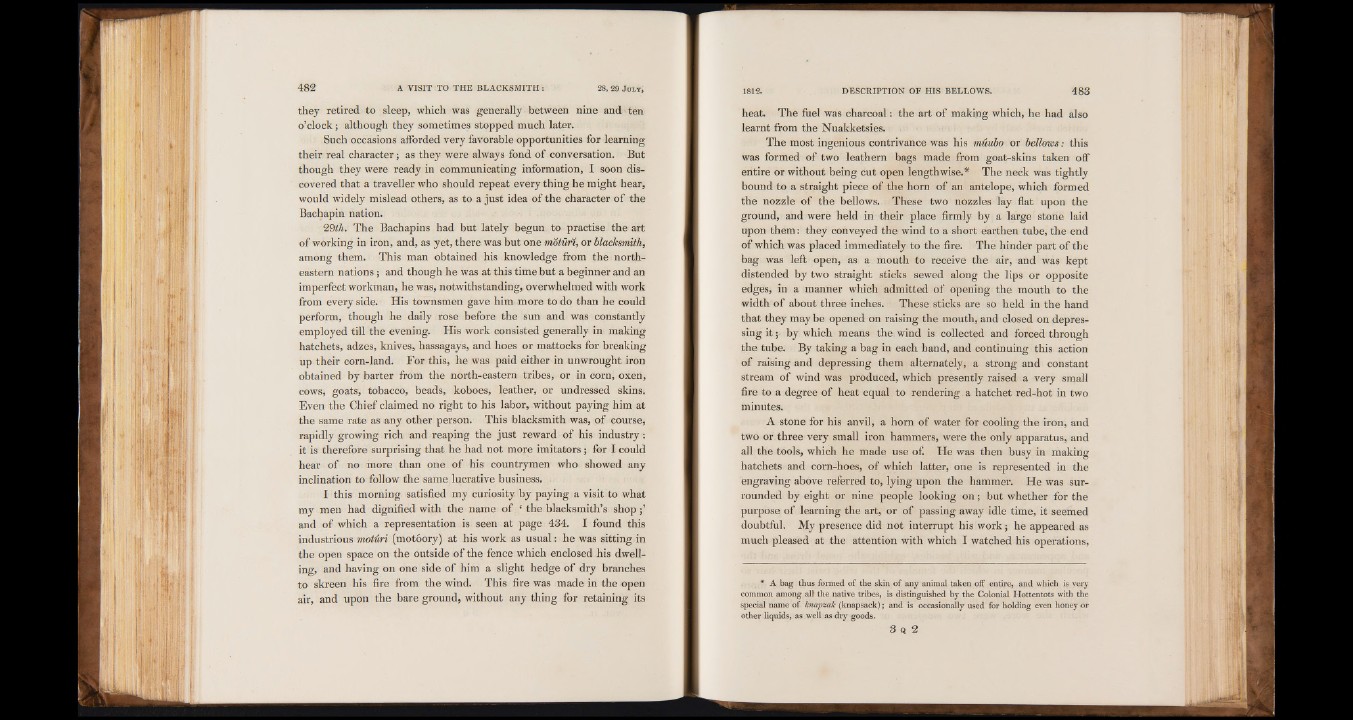
they retired to sleep, which was generally between nine and ten
o’clock; although they sometimes stopped much later.
Such occasions afforded very favorable opportunities for learning
their real character; as they were always fond of conversation. But
though they were ready in communicating information, I soon discovered
that a traveller who should repeat every thing he might hear,
would widely mislead others, as to a just idea of the character of the
Bachapin nation.
29th. The Bachapins had but lately begun to practise the art
of working in iron, and, as yet, there was but one m/jluri, or blacksmith,
among them. This man obtained his knowledge from the northeastern
nations; and though he was at this time but a beginner and an
imperfect workman, he was, notwithstanding, overwhelmed with work
from every side. His townsmen gave him more to do than he could
perform, though he daily rose before the sun and was constantly
employed till the evening. His work consisted generally in making
hatchets, adzes, knives, hassagays, and hoes or mattocks for breaking
up their corn-land. For this, he was paid either in unwrought iron
obtained by barter from the north-eastern tribes, or in corn, oxen,
cows, goats, tobacco, beads, koboes, leather, or undressed skins.
Even the Chief claimed no right to his labor, without paying him at
the same rate as any other person. This blacksmith was, of course,
rapidly growing rich and reaping the just reward of his industry:
it is therefore surprising that he had not more imitators; for I could
hear of no more than one of his countrymen who showed any
inclination to follow the same lucrative business.
I this morning satisfied my curiosity by paying a visit to what
my men had dignified with the name of ‘ the blacksmith’s shop;’
and of which a representation is seen at page 434. I found this
industrious mot&ri (motoory) at his work as usual: he was sitting in
the open space on the outside of the fence which enclosed his dwelling,
and having on one side of him a slight hedge of dry branches
to skreen his fire from the wind. This fire was made in the open
air, and upon the bare ground, without any thing for retaining its
heat. The fuel was charcoal: the art of making which, he had also
learnt from the Nuakketsies.
The most ingenious contrivance was his muubo or bellows: this
was formed of two leathern bags made from goat-skins taken off
entire or without being cut open lengthwise.* The neck was tightly
bound to a straight piece of the horn of an antelope, which formed
the nozzle of the bellows. These two nozzles lay flat upon the
ground, and were held in their place firmly by a large stone laid
upon them: they conveyed the wind to a short earthen tube, the end
of which was placed immediately to the fire. The hinder part of the
bag was left open, as a mouth to receive the air, and was kept
distended by two straight sticks sewed along the lips or opposite
edges, in a manner which admitted of opening the mouth to the
width of about three inches. These sticks are so held in the hand
that they may be opened on raising the mouth, and closed on depressing
it ; by which means the wind is collected and forced through
the tube. By taking a bag in each hand, and continuing this action
of raising and depressing them alternately, a strong and constant
stream of wind was produced, which presently raised a very small
fire to a degree of heat equal to rendering a hatchet red-hot in two
minutes.
A stone for his anvil, a horn of water for cooling the iron, and
two or three very small iron hammers, were the only apparatus, and
all the tools, which he made use of. He was then busy in making
hatchets and corn-hoes, of which latter, one is represented in the
engraving above referred to, lying upon the hammer. He was surrounded
by eight or nine people looking on ; but whether for the
purpose of learning the art, or of passing away idle time, it seemed
doubtful. My presence did not interrupt his work; he appeared as
much pleased at the attention with which I watched his operations,
* A bag thus formed of the skin of any animal taken off entire, and which is very
common among all the native tribes, is distinguished by the Colonial Hottentots with the
special name of Jcnapzak (knapsack); and is occasionally used for holding even honey or
other liquids, as well as dry goods.